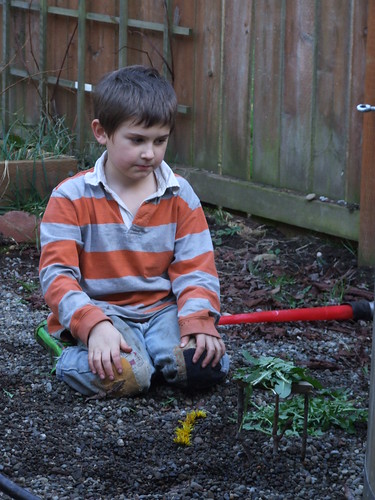
It's funny to me that my son, who just a few months ago was so realistic and pragmatic that he immediately guessed there was no tooth fairy when his first tooth fell out, because it was called a fairy and everyone knew that fairies aren't real, is now obsessed with fairies and all things magical.
He and his sister used to fight about whether fairies could be real, and all I could negotiate was a kindness and an agreement to agree to disagree. But then came Harry Potter, and The Spiderwick Chronicles and now he really wants to believe.
A man in the class I taught for my church on the history of Jerusalem was saying that he couldn't understand any form of "magical thinking" and that it really should be stamped out. But there is something in the human psyche that loves magical thinking, a part of us that just "wants to believe" as the X Files poster said.
I don't like to stamp on their childhood magical thinking - I remember how lovely it was to think I could see fairies and there seems no practical reason to ruin that for my kids. But I'm walking a fine line, because I never want them to think that I was really lying to them. So I fall back on the same noncommittal reactions that serve me very well as a Unitarian Universalist Religious Educator: "I wonder", "Some people believe that", and "I have never seen it to be true, but that doesn't mean I can prove it's not". It's not wishy-washy - it's open-minded!
So Carbon is deeply engaged in magical thinking right now, building fairy houses (inspired by the lovely Fairy Houses Everywhere), and guarding his Spiderwick Fieldguide with red because fairies fear red. It is sweet, and a bit magical in itself.



There is something to the developmental theories that point out that even imaginative play in the early years is often very pragmatic. When my kids are playing pretend at four years old right now, they are using it to figure stuff out. "Who has the power in this kind of scenario..." "What happens when I say..." "How do two people decide..." etc, etc. in addition to the expected imitatative pretend play to experiment with roles, jobs, and so forth.
ReplyDeleteThen something right around Carbon's age often shifts, and invites a new level of play. Freed from the developmental intensity of pragmatic pretend play, more fanciful play sometimes unfolds.
I don't feel the need to stamp out childhood magical thinking either, but I do feel that it should be primarily kid-driven and that adults can provide a helpful grounding spot for kids.
In regards to the tooth fairy, etc., we have always been upfront with our kids that it is a game. Right now, they are choosing to believe, so we are playing along.